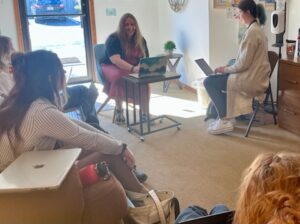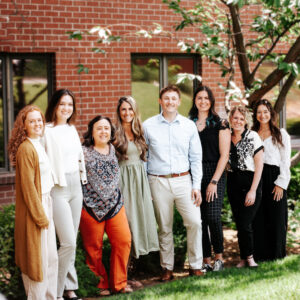Counselor Conversation with the Life’s Learning Team
This is a first of a series of counselor conversations that happen with our team and visiting professionals.
Personality Disorder Treatment: Research, Relating and Meaning Making

Over my many years, as a counselor, it has been interesting to observe how change (within the field) happens and evolves. I am beyond grateful that Melanie Person, PhD (an expert working with clients with personality disorders) agreed to come share with our team about the latest research and new trends affecting change around treatment and diagnoses recommendations. It was helpful to understand the shift with diagnosing that recognizes people even more in their humanity and less with labeling. It was also inspiring to learn from Melanie’s modeling of a natural, accepting, warm and honoring stance around “being with” clients.
Our team walked away with so much learning from our time with Melanie and examining what might be helpful in working with clients that have been diagnosed with a personality disorder. We were most inspired by the following:
- “People don’t care about what you know until they know that you care.” ~ Melanie Person ~
- The reminder that the professional relationship is most important and can be very reparative. That we must work to stay out of our clinical voice and more relational.
- Clinical decision making (including boundaries) is offered with the best interests of clients in mind and from a space of great care, despite any challenging behaviors/emotions that may show up.
- Clients benefit from a genuine, non-wavering, consistent and trust building relationship.
- Expanding the perspective from crisis and managing symptoms with people with personality disorders, to include meaning making and purpose following.
- A new way of thinking about personality disorders with a spectrum of traits versus labeling by category.
- Healing takes time, effort and intention.
While many of the above statements are true for most clients, with personality disorders, historically, symptom management has often been the primary focus with treatment. People with personality disorders are often stigmatized and their way of walking through the world can be difficult and be seen as “resistant.” Melanie introduced the idea that resistance is often evaluated in a negative way. She encouraged us to explore this more in terms of “What are the different ways that the client is showing resistance (e.g., late, no shows, frequent cancellations, interruptions, projections, relational pushing, doorknob drops, denials, arguing, yea buts, etc.) and is this actually “resisting the relationship” instead? If we recognize resistance as a signal of fear, a lack of trust and security, this allows us to vision how we create safety and build trust for the client to be vulnerable and explore new ways of interacting. If we shift from crisis and symptom management to a deeper dig into the client’s world, values and meaning making, they begin to explore a bigger purpose. This process takes time and effort for the client to learn to look within, to regulate and to heal. This is an invested process in another human and allows them to walk more completely in the world.
On more practical terms, Melanie also shared the latest research that merits attention:
- Clients with personality disorders have less narrative of past events earlier in life.
- 90-95% of people with a personality disorder had trauma before the age of 5.
- 50% of individuals with personality disorders have a concurrent substance use disorder.
Melanie also shared about upcoming changes in the ICD-11 that could be ground breaking around diagnosing personality disorders and evaluating these less based on categories (antisocial, narcissistic, etc.) and more on a spectrum of common traits versus characterization between the personally disorders. Some of this was first proposed in the DSM-5-TR (P. 881), while it is slightly different in the ICDl-11 now. This diagnosis will be made based on the spectrum of severity level (mild, moderate, severe) and includes the following 5 traits:
- Negativity reactivity.
- Detachment with intimacy and social relationships.
- Sociality around being antisocial, manipulative, hostile, callous and no regard for the rights or needs of others.
- Disinhibition, meaning impulsive, lacking self control, risk taking, irresponsible.
- Anankastia – Rigid perfection, over conscious, hyper controlled, unhappy when things are out of order
The only specifier with the disorder will be a Borderline specifier, which is a pattern of unstable self image, chronic feelings of emptiness and rejection sensitivity. Melanie also suggested that treatment outcome would be tied to decreasing the challenging traits.
Historically, there have been other models of care that have been found helpful in treating clients with personality disorders. Marsha Linehan was the founder of Dialectical Behavior Therapy (DBT). This modality has given us some guidelines to assist clients with anything from distress tolerance to wise mind and has had success with managing symptoms. A trend that expands upon this work also considers meaning making. Melanie shared how Logo Therapy (founded by Viktor Frankl) has been found to be helpful with this and identity confusion. Existential exploration allows such a deepening of exploration and seeing people in a more profound and honoring way.
In the past, when the focus has been more on reactions and managing crisis, clients could lose ground because the sense of something bigger was missing. Assisting clients to find meaning in their lives allows more depth of thought, action and emotion. Humanistic and mentalization based approaches are being found to be helpful as well, including mindfulness activities and tending to metacognition deficits, such as helping clients to be able to think about their thoughts or “How do I think about how I think?”
At the core of her work, Melanie impressed us with her message about the power of the human experience of being with people and meeting them where they are at. And in how rewarding it is to be a part of another person’s healing. To hold space is such an honor. We must remember that our role is as a healer. It is important that we have a strong sense of self, that we be aware of own capacity and be in a space to not personalize challenging behaviors. Our role is to be a conduit for change and an example of the good and kind humanity, much as Melanie modeled for our little team when she visited.
About Melanie Person:
Melanie Person, Ph.D., LMHC, LCPC
Associate Professor
Gonzaga University
Department of Counselor Education
Director, Master of Counselling (Canada)
509-313-3631
person@gonzaga.edu
About the Author:
Suzanne Apelskog, MS, LMHC
Owner of Life’s Learning and Counselor/Clinical Supervisor
(509) 433-7755
SuzanneA@lifeslearning.org

Life’s Learning Team
